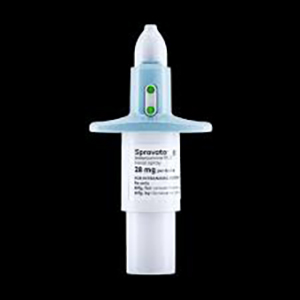
Depression can sometimes be a difficult condition to treat since patients don’t always predictably respond to treatment protocols. In particular, conventional medications aren’t always effective for every person.
An anesthetic called ketamine shows promise as a depression treatment when used in low doses as part of a management plan. While there are no United States Food and Drug Administration (FDA) approvals in place for ketamine, off-label use is common and, for many people, effective.
A derivative of ketamine, Spravato®, may be a game changer. For people with a history of failed treatments for depression, a condition called treatment-resistant depression (TRD), this esketamine nose spray often provides results where other medications fall short. The FDA does approve Spravato for treating TRD.
KETA Medical Center specializes in esketamine and ketamine treatments for a wide range of conditions. Contact us if you’ve been diagnosed with TRD.
How is esketamine different from ketamine?
Though they’re related, esketamine and ketamine have distinct chemical differences. They’re administered in their own doses and through different means.
Ketamine is typically administered by intramuscular injection or through intravenous (IV) infusion. It’s approved as an anesthetic by the FDA, though it has a wide range of off-label uses, including treatment for depression.
Esketamine, the active medication in Spravato, uses nasal spray delivery. Part of its FDA approval includes a strict treatment protocol, while ketamine has no similar drug safety program.
How does Spravato work?
Though it is an easy-to-use nasal spray, its treatment protocol requires administration in a physician’s office under supervision. Clinical studies show that esketamine is both safe and effective. Still, because its intended use targets patients who may be severely depressed or suicidal, the need for medical supervision to confirm the proper use of the drug becomes obvious.
Spravato is effective because it uses different chemical pathways in the body from those of conventional antidepressant medications. Typically, antidepressants increase levels of substances like dopamine, norepinephrine and serotonin, chemical messengers that are thought to improve mood in higher quantities.
Spravato also increases levels of a mood-enhancing messenger called glutamate, which is the most abundant excitatory neurotransmitter in the brain. It has the ability to affect more of the brain’s cells at one time than conventional depression medications.
The Benefits of Spravato
This alternate anti-depression treatment pathway offers new approaches to treating depression. Spravato’s treatment protocol includes both talk therapy and another antidepressant medication being used alongside esketamine, providing a multi-pronged approach to depression care.
Fast Relief
Conventional antidepressants typically take weeks to show results. Spravato delivers results in hours, sometimes even before you’ve left our office.
Effective for TRD
As many as one-third of those with depression see no relief from conventional treatment. More than half of those patients experience improvements after esketamine therapy with Spravato.
Reduced Suicidal Thoughts
Sometimes, conventional antidepressants can increase suicidal thoughts and tendencies early in the treatment, particularly in younger patients. Esketamine has shown promise in reducing suicidal thoughts.
New Neural Pathways
Depression can take a physical toll on the brain, shrinking the hippocampus, a part of the brain crucial for learning and memory. Spravato prevents this deterioration and may also promote new growth.
Is Spravato right for you? Go to www.ketamc.com to schedule a free phone consultation for treatment at the nearest of our four offices in New Jersey, Westchester and NYC.
Dr. Haviva Malina is a practicing Emergency Medicine physician for over a decade. She received her medical degree from Albert Einstein College of Medicine followed by a residency in Jacobi Medical Center, and has worked at multiple hospitals, but is currently an attending physician at Hoboken Medical Center.












